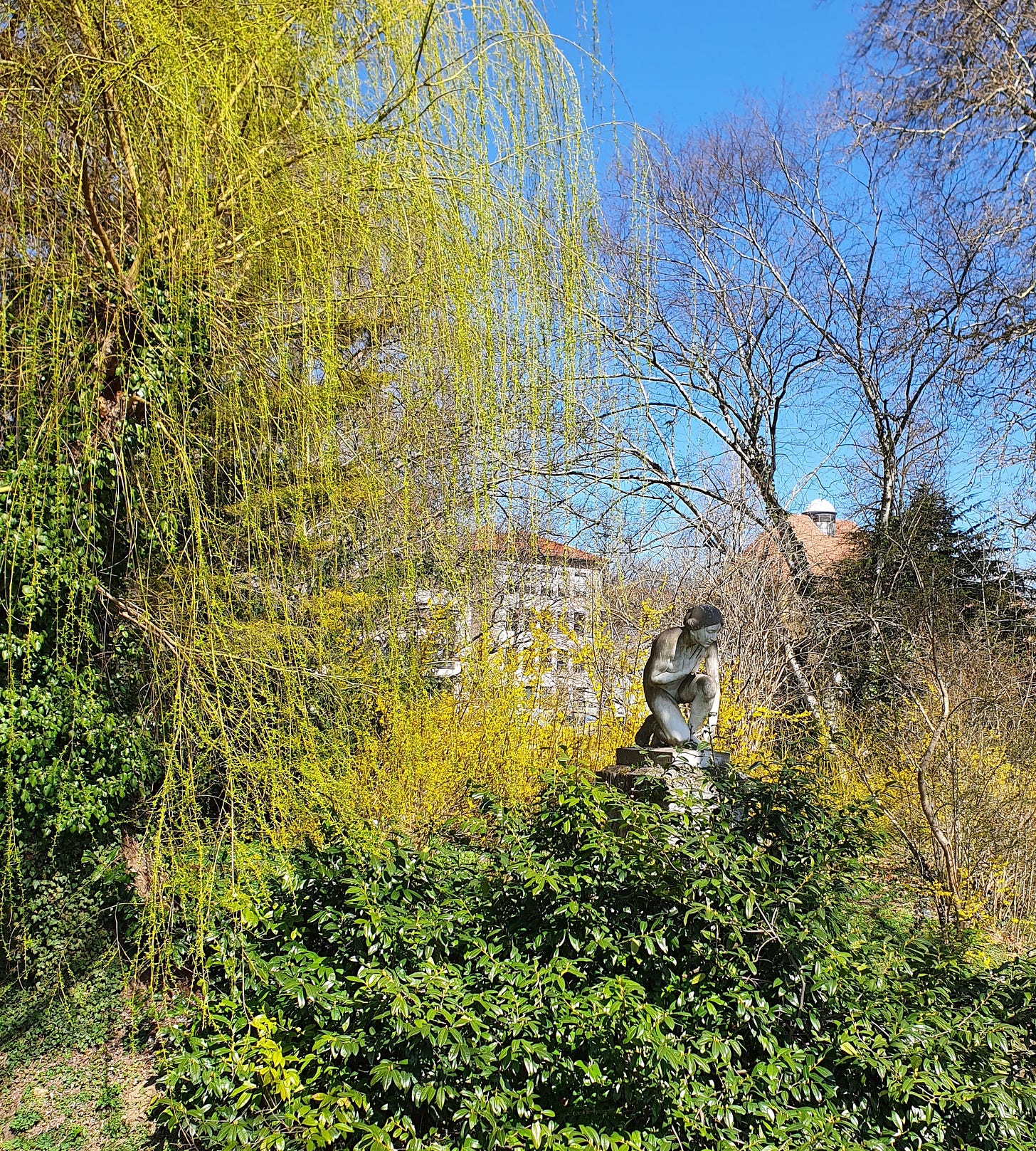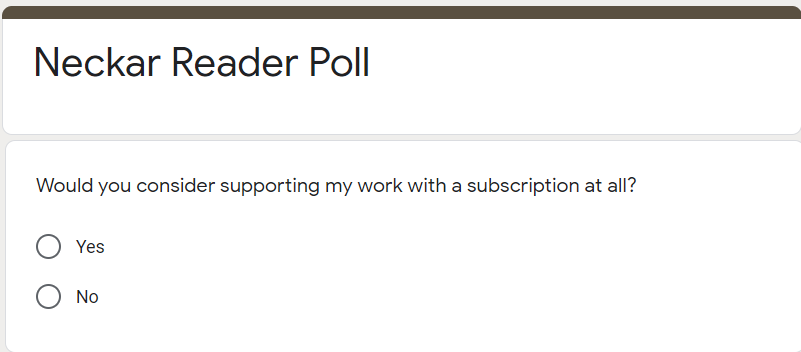Hi all,
It’s been a busy few weeks and about time to share some thoughts on the journey. I feel clarity now that I would love to pursue writing and creating content full-time, if possible. Earlier this year I was still working on research consulting projects. It was necessary but distracting. There are just so many people, companies, and stories worth exploring and writing about. There’s just so much going on.
However, writing full-time would require me to go pro, to turn on the paid subscription. I’ve been pondering how to do this for some time. Some writers put the most valuable content behind the paywall – be it a stock idea or an in-depth write-up. Others leave those pieces in public where they can be read most widely. The teacher in me takes issue with the idea of not sharing my in-depth writing as widely as possible. In that case, the writer has to offer something else, something extra, to paying subscribers. I’ve seen different examples of this, including more personal writing, interviews, letting paying subscribers vote on future content, and community discussions.
Case in point, I’m going to experiment with my first interview today.👀 I was going to talk to this person anyway and figured, why not record it and make it available to my readers. It’s an experiment and we’ll see how it goes.
Another way would be to cut the in-depth pieces up and share only the first part for free. Or put it behind the paywall for a certain time before releasing it to free subscribers.
I’m also being told that the key to a happy audience is a consistent writing cadence. That’s something I would aim for. It’s been a challenge in part because of the length of my writing. For example, last week I started reading dozens of articles about Craig McCaw, a fascinating entrepreneur who pioneered the wireless business in the US. I found so many lessons and much inspiration in his story. The first draft ran close to 5,000 words. There is just no way I can research, write, edit, and publish that consistently on a weekly basis. So perhaps there will be a shorter weekly piece and in-depth profiles on a slower cadence, perhaps every other week.
Another example: at this point I have read several books about Barry Diller and people he mentored, plus a ton of articles. I haven’t seen anyone put the pieces together that show his system of using the Hollywood model in tech/venture. He has a bold approach to developing young executives and creating idea flow. It’s relevant for anyone in an idea-driven business – investing, building startups, or in media. Frankly for anyone leading people. And yet I haven’t found a comprehensive analysis anywhere.
My approach has been: if I do a ton of research anyway, I might as well share it with my readers. If you don’t have time to read it all right now, it becomes part of your personal archive. You can reference it. Learning from the main characters doesn’t grow stale.
However, I understand that a more frequent and consistent cadence, as well as shorter pieces, would be more reader-friendly. And definitely better to build a larger following which would make it possible to get a sponsor for free pieces. Therein lies the tension.
It all reminds me of the conversation between Marc Andreessen and Brian Koppelman in this email’s podcast section. Marc argues that the value of creation – whether art or tech – doesn’t exist in isolation but in the relationship to the audience. Which runs counter to the idea that artists should just pursue their passion.
To me, being able to write and create for a living would be a dream come true. But it doesn’t happen in isolation – it’s happens with you, the reader. Which is why I would love to hear your feedback before making my decision. Go to the polls, vote!
(I’ve been lobbying Substack to give us polling and feedback function embedded in the platform such that we can scrap the Google Forms workaround. Let’s see what they come up with.)
Link to the Google Form:
(Of course you can also email me, as always.)

Weekly Learning
Podcasts
Marc Andreessen with Brian Koppelman (from 2019, Twitter notes). They discuss the creative process, similarities between artists and entrepreneurs, and debate whether to create out of passion or in service to the audience. I don’t agree with Marc’s perspective to dismiss passion and focus on service and the relationship to the world. That’s a tech/product development-centric view. However, I think he’s absolutely right that a disengaged creator risks bitterness and resentment – and financial ruin. You might also enjoy the discussion about picking people vs. ideas, why warm introductions are the key test at Andreessen Horowitz, how to think about startup pivots with Slack as the case study.
Another nugget: Andreessen explained how when he started building the first browser, Mosaic, the internet felt like a ‘secret.’ Mainstream attention was entirely focused on interactive TV. This goes to Peter Thiel’s notion that every great company is built on a secret.
"The world is busy. People already have stuff going on. People don't wake up and say, 'I can't wait to find out what this person that I've never of has invented.' You have to inject yourself in the world. In our world, the successful people are the ones that are able to create and are able to push into the world."
"This is the test: can you get one warm introduction. Just one. If you can't pass the test of getting one inbound referral, what that indicates is you're going to have a hell of a time as an entrepreneur. Because once you raise money from us is when the pain begins. The pain of trying to get other people to say yes to you."
"People treat their ideas like their children. I think it's evolutionary. This is my offspring, the thing I want to protect and foster. Someone challenges your idea, you feel it. You get defensive. Here's the problem: most of your ideas are wrong. Especially in my business."
"I don't know that there actually are VCs who can predict whether any given thing is going to succeed or fail. That might be zero of our contribution in the entire process. Maybe we're actually in the people business, as opposed to the ideas business. Maybe what we should be trying to sniff out are the people. And maybe the point of sniffing out the people is the people are the ones who are going to figure all this stuff out."
Sanjay Ayer with Bill Brewster. Sanjay works at WCM, a culture-focused investment manager. I most enjoyed his thoughts around how to build a culture that avoids the traps of the investment industry – groupthink, fixed mindset, career risk for admitting mistakes. How do you turn that on its head: talk openly about mistakes. Keep and share decision journals. WCM built a business by “flouting the unwritten rules of the industry.”
“I’m at a YUM brands analyst day and Taco Bell management is up on stage talking about new Chalupa or something, and I’m sitting there in a suit taking notes about a new Chalupa and it struck me 'what am I doing with my life.'"
"If you're trying to make money all the time, you're less likely to make money over time."
"People waste years because they're not willing to waste hours."
“If we could hire for any quality it would be a keen, keen sense of self awareness.”
Reading
I find one of the challenges of long-term “work from home” to be the lack of new input and stimulation. I didn’t like my daily commute. But there was often something interesting to observe. I remember the crackling announcements on the New York City subway. It was perfect to let the mind wander, follow the rails and the wires and imagine the stories of the city around me.
This writer profile speaks to the need of both discipline – to work, write, create no matter what – and also to find new environments and stimulate the senses. I once heard Neil Gaiman explain on a podcast that he wrote entire books in hotel rooms he had rented just for the purpose of writing. I like having routines. But it’s dangerous to get comfortable and let the thinking get stale.
“I’m not great at writing in the house, though I’m better now,” Coben said in an interview last month, nearing the one-year anniversary of the Covid-19 shutdowns in the United States. “I would take them off to whatever school, and then I would find a coffee shop or a library or any weird place. I keep changing places. Most writers have a set routine, a set place. My routine is to not have a routine.”
While one of his sons was in high school, Coben spent six months writing at a Stop & Shop deli counter with a coffee stand next to it. “I came home smelling like olive loaf.”
I don’t spend much time on Clubhouse and it feels like the hype is fading. Having said that, occasionally really interesting conversations take place. Like this one with Mark Zuckerberg, Daniel Ek, and Tobi Lütke (transcript). I wouldn’t spend too much time on the transcript, I didn’t get that much out of it. But I did find it interesting to see these three engage in public – and apparently they talk with some regularity. “I think we've gotten together a few times since then.” It’s like we’re seeing a bit of a changing of the guard in Silicon Valley. Bezos is retiring while this generation of entrepreneurs, in their late 30’s and early 40’s, is still young and hungry. If you’re interested in keeping track of clubhouse without spending a lot of time listening, there’s a substack for that.
You might have seen this already but Ben Thompson broke down Pat Gelsinger’s new strategy for Intel and it felt like a case study in establishing a new narrative. Gelsinger decisively shifted the narrative. Would you rather earn free cash flow now and own a value stock? Or can we create conviction in the future of this company, of the terminal value, and move it into the growth box? It remains to be seen whether he can deliver. But it’s an easy exhibit to pull out when someone claims the public market cares primarily about short-term profits to the detriment of long-term investment. Simply. Not. True. It’s just that the market is skeptical and has to be convinced of the long-term strategy.





The name Craig McCaw is a blast from the past: The old Nextel (nxtl) shares from the 2002 telecom bust were my first big score.
"The first draft ran close to 5,000 words. There is just no way I can research, write, edit, and publish that consistently on a weekly basis. So perhaps there will be a shorter weekly piece and in-depth profiles on a slower cadence, perhaps every other week."
Another option would be to break up the longer pieces in parts. Part 1 one week, part 2 later..